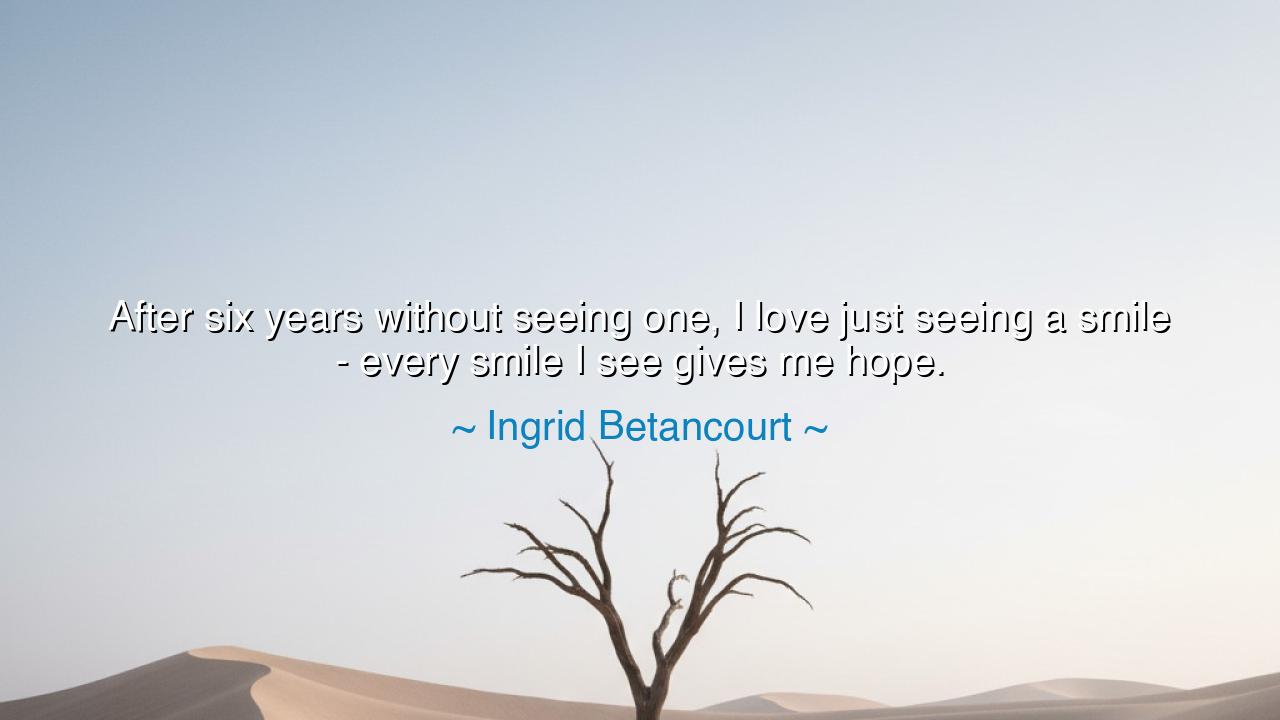
After six years without seeing one, I love just seeing a smile -
After six years without seeing one, I love just seeing a smile - every smile I see gives me hope.






The words of Ingrid Betancourt flow with the sorrow of captivity and the light of deliverance: “After six years without seeing one, I love just seeing a smile – every smile I see gives me hope.” These words are not spoken lightly, but forged in the crucible of suffering, in the deep shadows of imprisonment where joy was banished and light scarce. They teach us that the simplest gestures, those we take for granted in daily life, become treasures beyond measure when stripped away. A smile, which the free pass over in haste, becomes to the prisoner a vision of paradise, a sign that life still carries goodness.
For six long years, Betancourt was held hostage in the jungles of Colombia, her world confined to chains, threats, and endless fear. In such a place, even the smallest acts of warmth were absent. No laughter echoed. No smiles shone. To live without the sight of a smile is to live in a desert where no flowers bloom, where the heart forgets what light looks like. Thus, when she was freed, the simple act of seeing others smile again became a sacred gift. Each smile carried with it hope, the reminder that cruelty does not have the final word, that humanity still holds tenderness.
History offers us similar testimonies. Consider Viktor Frankl, survivor of the Nazi concentration camps, who wrote in Man’s Search for Meaning that even a fleeting kindness, a smile, or a shared word of courage could lift the soul above despair. Surrounded by death and degradation, such moments were rare, yet when they came, they shone brighter than the darkest night. Like Betancourt, Frankl knew that when the body is imprisoned, it is these small glimpses of humanity that keep the spirit alive.
The smile here is more than expression—it is symbol. It is the banner of life against death, joy against sorrow, light against darkness. To smile is to proclaim that despair has not conquered, that beauty and kindness still exist even when the world seems broken. For Betancourt, every smile became a wellspring, a living reminder that beyond the walls of captivity, people still laugh, still hope, still live in freedom. And for us who are free, her words remind us to treasure these small signs, for they are not small at all—they are the threads that bind our humanity.
The origin of her reflection lies in deprivation. When one is denied something so ordinary for so long, its value is magnified. Like water to the thirsty, bread to the starving, a smile to Betancourt was salvation. This truth should awaken us: we, who see smiles daily, often forget their power. We pass them without thought, unaware that each one carries within it the power to heal, to uplift, to give hope to another soul.
The lesson, then, is profound: never underestimate the gift of a smile. To you it may be ordinary, but to another it may be life itself. In your daily walk, do not hold back your warmth. Offer it freely, for you do not know what silent prisons others are enduring—be they prisons of grief, of fear, or of loneliness. Your smile may be the light that breaks their night, the hope that carries them one step further.
Therefore, let us act with gratitude and with purpose. Cherish the smiles you see. Give your own smile generously, even when you feel weary. Remember Betancourt’s testimony, and let it remind you that every smile is sacred, a weapon against despair. For in smiling, we do not only express joy—we create it, we plant it in others, and we carry it into the darkest corners of the world.
Carry this wisdom like a torch: “Every smile I see gives me hope.” May it remind you that hope is not always found in grand victories or mighty deeds, but in the small, radiant gestures of humanity that pierce the shadows and keep the spirit alive.






AAdministratorAdministrator
Welcome, honored guests. Please leave a comment, we will respond soon